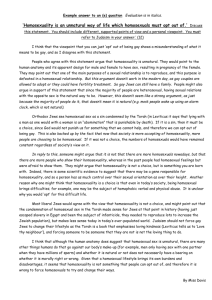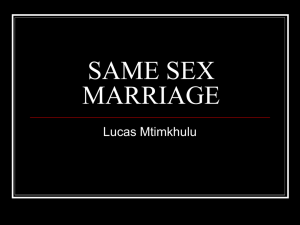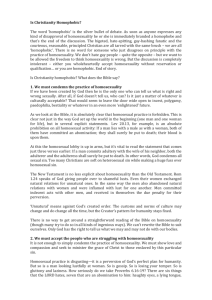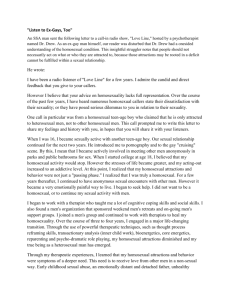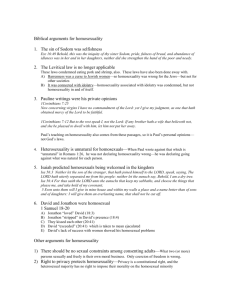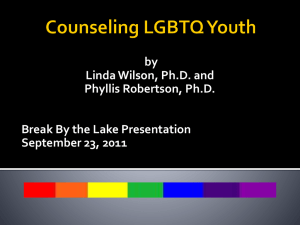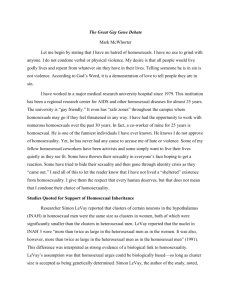Lesson Title
advertisement
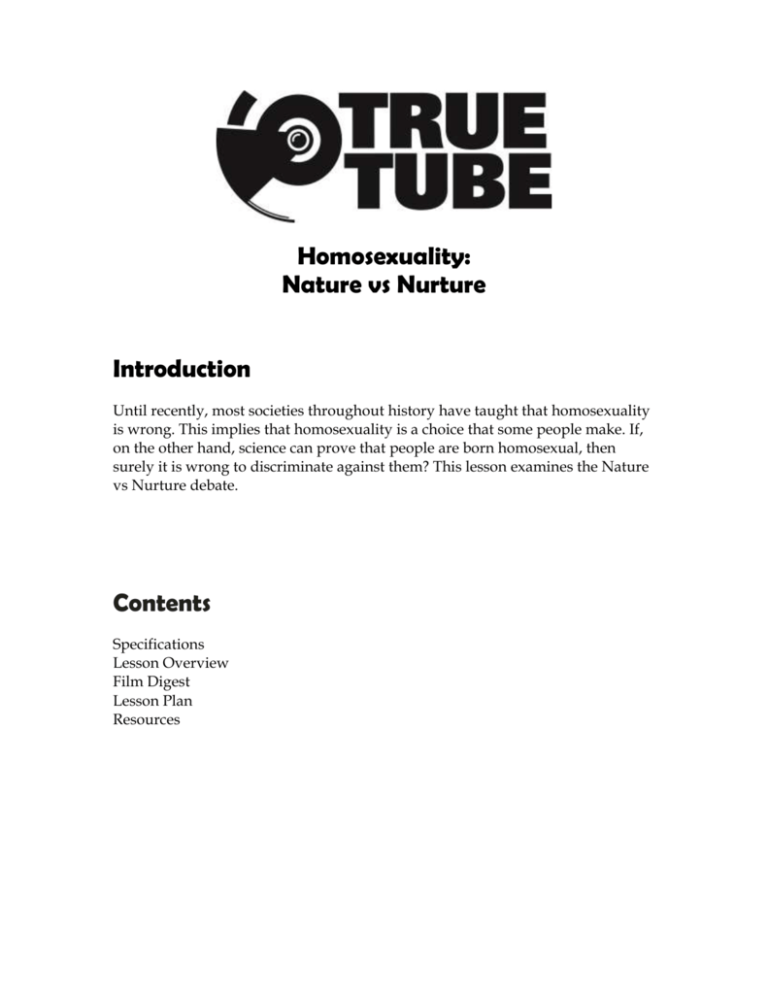
Homosexuality: Nature vs Nurture Introduction Until recently, most societies throughout history have taught that homosexuality is wrong. This implies that homosexuality is a choice that some people make. If, on the other hand, science can prove that people are born homosexual, then surely it is wrong to discriminate against them? This lesson examines the Nature vs Nurture debate. Contents Specifications Lesson Overview Film Digest Lesson Plan Resources Specifications This lesson would be useful for the following GCSE Specifications: EdExcel Religion & Life - Section 3 – Marriage & the Family OCR – A Unit B603 Ethics – Religion & Human Relationships OCR – B Unit B603 Ethics 1 – Religion & Human Relationships AQA – A Unit 2 Unit 9 Unit 11 Christianity Ethics – Sexual Relationships Islam Ethics – Relationships & Lifestyle Judaism Ethics – Relationships & Lifestyle AQA – B Unit 1 Religion & Citizenship – Religion & Relationships WJEC – A Unit 1 Christianity – Values & Commitments – Personal Relationships Roman Catholicism 1 - Values & Commitments – Personal Relationships Hinduism - Values & Commitments – Personal Relationships Islam - Values & Commitments – Personal Relationships Judaism - Values & Commitments – Personal Relationships Unit 3 Unit 6 Unit 7 Unit 8 WJEC – B Unit 1 Religion & Life Issues – Relationships Overview Suitable for: Key Stage 4 Lesson Objectives: To consider whether people are born gay, become gay or choose to be gay. To learn what the Religions believe about homosexuality. Key Question: Are people born gay? Time: 1 hour True Tube Films: Nature vs Nurture (Theme: Relationships Topic: Sexuality) The Trouble with Being Gay (Theme: Relationships Topic: Sexuality) Gay & Married (Theme: Relationships Topic:Sexuality) Resources: Internet connected whiteboard or enough PCs for the class. Nature vs Nurture question sheet Nature vs Nurture answer sheet Religious Views on Homosexuality sheet Key Words: Homosexual Heterosexual Nature Nurture Homophobia Film Digest Nature vs Nurture (3:58) Theme: Relationships Topic: Sexuality A psychologist shares evidence on whether homosexual is something you're born with or something that it is socially conditioned. His discussion covers the idea of a 'gay gene' and the history of homosexuality. The film also features interviews with members of the public regarding their views on the topic. The Trouble with Being Gay (3.04) Theme: Relationships Topic: Sexuality A young Pakistani Muslim talks about the consequences of coming out at such an early age. Always conscious of his differences he describes being a victim of bullying at school. Admitting he was gay estranged him from his family and his community. He regrets having come out so soon. Gay & Married (3:11) Theme: Relationships Topic:Sexuality Keeping up appearances: a South Asian Muslim talks about the trauma of realising he was gay in a community that rejected it. Coerced into marriage he went on to have a child but the relationship eventually broke down. He now helps other young men come to terms with their sexuality and their faith. Lesson Plan Starter Ask the class to indicate if they are left handed. Tell them that OFSTED has decreed that all students must now write with their right hands and that if you see anyone writing with their left hands, then they will be in detention. Depending on how good an actor you are, or how sensitive your class is, you could keep this going for a few minutes perhaps while they (try to) write down the key words. Hopefully there will be an outcry. Ask the students why on Earth they shouldn’t write with their right hands anyway. Left-handers are just being awkward. Discussion should lead the students to the conclusion that left handers cannot help being left handers - it’s how they were born. 5 mins Explain that some people believe that it’s the same for homosexuality – a person is born that way. Others believe that a person becomes homosexual because of the way they were brought up or because of experiences they’ve had. Others believe that homosexuality is a lifestyle choice. Explain the meaning of the key words: Homosexual Heterosexual Nature Nurture Homophobia A person who is sexually attracted to people of the same gender. A person who is sexually attracted to people of the opposite gender. The view that people are born a certain way (e.g. homosexual or heterosexual) The view that people become a certain way because of their upbringing. Prejudice directed against homosexual people. 5 mins Main Activities 5 mins Show the True Tube Film: Nature vs Nurture. As they watch, the pupils should have a go at these questions (provided on a worksheet in the resources section): Nature, nurture or choice? Which is right according to Dr Glen Wilson? What effect do social factors have on someone’s sexuality? Is there any evidence that people choose to be homosexual? Can people really be bi-sexual? What is ironic about homophobic people? Are there more homosexual people now? Why aren’t people openly gay in some countries? Is there such a thing as a “gay gene”? Is there any physical difference between heterosexual and homosexual people? Go through the answers with the class (provided in the resources section if you missed them yourself!) and ask for opinions. 10 mins Read the information sheet Religious Views on Homosexuality. 20 mins You will probably want to concentrate only on the religions you are studying, but the section on Islam would be useful (but not essential) for when you show next film. The students should write a short summary of the main views, making sure they use all the words in bold. Plenary - Has Learning Taken Place? Show The Trouble with Being Gay. Your students should imagine that they are working on the problem page of a teen magazine and they have received a letter from a teenage Muslim boy, describing the kind of abuse that Hamzar (the man on the film) experienced. What advice would they give? They should bear in mind two issues: 10 mins 1) Do the students believe in nature or nurture? 2) Do they advise the boy to go against the teachings of his religion? To finish, hear what a few of the students have to say. Extension - Suggested Further Activities The film Gay and Married further explores the problems of being Muslim and gay (and, indeed, married). This work could lead into a “Science vs Religion” discussion. If it was proved beyond doubt that homosexuality was something people are born with, how would that affect Religious views? Would it affect them at all, or force them to re-interpret their scriptures? 5 mins Resources Nature vs Nature (questions for the film) Nature vs Nurture (teacher’s answers) Religious Views on Homosexuality (Information sheet) Nature vs Nurture In this film, Dr Glenn Wilson talks about the scientific research into human sexuality. Watch and listen carefully and note down your answers to these questions: Nature, nurture or choice? Which is right according to Dr Wilson? What effect do social factors have on someone’s sexuality? What evidence is there that people choose to be homosexual? What is Dr Wilson’s opinion of bi-sexuality? What is ironic about homophobic people? Is the number of homosexual people increasing or decreasing? Why aren’t people openly gay in some countries? How far do our genes affect our sexuality? Is there any physical difference between heterosexual and homosexual people? Nature vs Nurture (Teacher’s Answers) Nature, nurture or choice? Which is right according to Dr Wilson? According to Dr Wilson: nature – sexuality is decided before birth. What evidence is there that social factors affect someone’s sexuality? None – people raised by homosexual parents are no more likely to be homosexual than people raised by heterosexual parents. What evidence is there that people choose to be homosexual? None – although people might experiment. What is Dr Wilson’s opinion of bi-sexuality? It is rare – most people who claim to be bi-sexual are actually attracted to one gender. What is ironic about homophobic people? Homophobes are more likely to be aroused by homosexual images. Is the number of homosexual people increasing or decreasing? It remains constant, although the manifestation of homosexuality changes. Why aren’t people openly gay in some countries? In some countries (eg Iran) homosexuals can be executed. How far do our genes affect our sexuality? There is no evidence of a “gay gene” although a variety of genetic factors might have an affect. Is there any physical difference between heterosexual and homosexual people? There are differences in the structure of the brain. Religious Views on Homosexuality Christianity There are five clear mentions of homosexuality in the Bible. Genesis 19:1-14 tells of two angels coming to stay with a man called Lot in a notoriously evil city called Sodom. While they were there: “all the men from every part of the city of Sodom - both young and old - surrounded the house. They called to Lot, ‘Where are the men who came to you tonight? Bring them out to us so that we can have sex with them.’” This is clearly not very welcoming behaviour and God soon punishes the city for its evil ways by destroying it completely. Only Lot and his children escape. Leviticus is a book full of laws for the Jewish people and homosexuality is forbidden in no uncertain terms: “Do not lie with a man as one lies with a woman; that is detestable” (18:22) and, “If a man lies with a man as one lies with a woman, both of them have done what is detestable. They must be put to death; their blood will be on their own heads.” (20:13) However, all three of these quotes are from the Old Testament. Christians believe that the Old Testament is true, but they do not believe they have to obey all the laws that were clearly meant for the Jewish community. However, it can be difficult deciding which rules should be followed and which can safely be ignored. Obviously, Christians should do their best to follow the Ten Commandments, but should they also follow the rules about food preparation? The New Testament is different matter. It was written by the early Christians and contains teachings that they should follow. The book of Romans (1:26-27) describes a time when people did not follow God and lists homosexual acts among the things they got up to: “the men also abandoned natural relations with women and were inflamed with lust for one another. Men committed indecent acts with other men, and received in themselves the due penalty for their perversion”. This implies that only Godless people would do such a thing. In a similar vein, 1 Corinthians (6:9-10) includes homosexuals on a list of people who will not be going to Heaven: “Do not be deceived: Neither the sexually immoral nor idolaters nor adulterers nor male prostitutes nor homosexual offenders nor thieves nor the greedy nor drunkards nor slanderers nor swindlers will inherit the kingdom of God.” Some people say that 1 Timothy (1:9-10) also condemns homosexuals: “We also know that law is made not for the righteous but for lawbreakers and rebels, the ungodly and sinful, the unholy and irreligious; for those who kill their fathers or mothers, for murderers, for adulterers and perverts, for slave traders and liars and perjurers—and for whatever else is contrary to the sound doctrine.” The word translated from the original Greek as “perverts” also includes homosexuals, or so the argument goes. For Evangelical Christians, the Nature vs Nurture debate is largely irrelevant. As with all things, they would consult the Bible to see what it says about homosexuality, and then apply it to their lives. The Bible says it is wrong, therefore Evangelicals do not accept that Christians can live as homosexuals. Some say it is a mental illness that can be cured. Others say that even if it is someone’s nature, homosexual relationships are still wrong. Or, to put it another way – being homosexual isn’t wrong, doing homosexual things is. Liberal Christians would argue that the Bible was written at a time when homosexuality was not understood. Also, all three of the New Testament passages were written by the same person – Paul – and it might just be his opinion, not the opinion of the early Church. Liberal Christians would say that Jesus’ teaching of loving your neighbour applies in this case. As long as someone is in a committed and faithful relationship, then it doesn’t matter what their sexuality is. In the Church of England, the different views on homosexuality threaten to cause a split between those who believe homosexual acts are wrong and those who believe homosexuality should be accepted. There are already some openly gay priests and a few churches will even bless same-sex relationships, although this has never been officially allowed by the General Synod (the Church of England’s governing body) and there is no official ceremony. Other denominations have already made up their minds. The Roman Catholic Church teaches that any sexual act must potentially lead to pregnancy. Or, to put it another way: if you can’t get pregnant by doing it - don’t. For this reason, Catholics believe that homosexual sex and contraception are wrong. On the other hand, Quakers have been celebrating same-sex unions since 1987, with a ceremony very similar to a Quaker wedding. Islam The vast majority of Muslims agree that homosexuality is haram (forbidden). They would say that a person chooses to be homosexual, it is not a person’s nature. There are two mentions of homosexuality in the Qur’an, although both are open to interpretation. First of all in Surah 4: “If two men among you are guilty of lewdness, punish them both. If they repent and amend, leave them alone; for Allah is Oft-returning, Most Merciful.” (4:16 Yusufali) And then the story of Lut (or Lot) in Surah 7, which is similar to the story as told in the Bible: “We also (sent) Lut: He said to his people: ‘Do ye commit lewdness such as no people in creation (ever) committed before you? For ye practise your lusts on men in preference to women: ye are indeed a people transgressing beyond bounds.’ …And we rained down on them a shower (of brimstone): Then see what was the end of those who indulged in sin and crime!” (7:80-84 Yusufali) Muslims believe that sex was created by God for the procreation of children and therefore homosexual sex is wrong, because it removes that possibility. Although the Qur’an recommends forgiveness for men who “repent and amend”, several Hadith (sayings of Muhammad) record the Prophet recommending the death penalty for homosexuals. The Hadith can be unreliable so the various schools of Shari’ah Law are divided on what should be a suitable punishment. Homosexuals can be sentenced to death in some Muslim countries (eg Saudi Arabia, Iran, Mauritania, Sudan and Yemen), whilst in others (eg Bahrain, Qatar, Algeria and the Maldives), homosexuals are put in prison or given corporal punishment (eg a public beating). There is a small minority of Muslims who argue that the Qur’an does not condemn homosexual love, just sexual attacks (in the story of Lut) and adultery (in the context of Surah 4). They say that if someone is born homosexual, it’s their nature and God must have created them that way. Judaism There are several branches of Judaism, broadly divided into three groups: Orthodox Judaism, which has a strict traditional interpretation of the Torah; Reform Judaism which believes that the Torah needs to be re-interpreted for the modern world, seeing it more as a book of guidelines than a book of rules; and Conservative Judaism which is somewhere in the middle, acknowledging that Jews have to keep up with the modern world, but at the same time wanting to conserve traditional Judaism (hence the name “Conservative” – it doesn’t mean that they vote for the Conservative party). Because of the story of Lot in Genesis and the laws in Leviticus, Orthodox Jews believe that homosexuality is wrong. However, the death penalty no longer applies because a sentence of death can only be passed by a court of the Jewish Temple which hasn’t existed for 2000 years. Some Orthodox Jews believe that homosexuality is a mental illness that can be cured, while others say that being homosexual is not wrong, but homosexual relationships are. Reform Jews would say that because scientific research suggests that sexuality is something we are born with, the traditional laws need to be re-thought. Most Reform Jews would allow homosexuals to hold positions of authority in a synagogue, such as Rabbi or Cantor (the person who leads the prayers) and even celebrate same-sex marriage. However, Reform synagogues retain the right to disagree with this view if their congregations want to. Some Conservative Jews agree with the Orthodox view, some agree with the Reform view. Most Conservatives would agree that homosexuals should be accepted and might even agree to the blessing of a same-sex relationship (when prayers are said for the couple) in a synagogue. However, they generally do not agree with same-sex marriage, because one of the purposes of marriage is to have children, nor would they allow a homosexual to become a Rabbi or Cantor. Sikhism The Guru Granth Sahib (the Sikh holy book) does not mention homosexuality. It is a goal of Sikhism to treat all human beings as equals regardless of race, caste, colour, creed, gender, or sexuality. Also, marriage is seen as the union of two souls, and the soul is believed to be sexless, so it seems that there is a strong argument for the acceptance of homosexuality in Sikhism. However, most Sikhs believe that homosexual sex is wrong. It is the duty of all Sikhs to marry and have children. Same-sex marriage then, like celibacy, is not allowed. Sikhs who have homosexual desires are encouraged to ignore their sexual feelings in favour of a higher spirituality. In fact all Sikhs should aim for a higher spirituality and their relationships should be based on love and respect rather than lust. Hinduism There are many holy books in Hinduism. Some are considered to be shruti (“heard”), which are believed to have come from Brahman (God) and some are considered to be smriti (“remembered”) which were written by humans. Homosexuality is not mentioned in any of the shruti texts, but it is condemned in some of the smriti books: The Mahabharata says, "Foolish and evil men engage in all forms of sexual intercourse without a female womb, forcing themselves upon other men. They are born again without their organs as neuters." (13.145.52). The Garuda Purana lists homosexual acts among the sins that will be punished in Naraka (the Hindu equivalent of Hell) before being re-born. The Bhagavad Purana includes a story about Brahma’s creation of all the beings on Earth which included, “the godless who, fond of sex, approached the Creator in lust for copulation. At first the worshipful Lord had to laugh about being followed by the shameless ones of darkness, but he then, terrified and annoyed, hurried to get away” (3.20.23-24). Some say that this describes the evils of homosexual lust. Finally, one of the duties in Hindu marriage is to have children, so the evidence would suggest that Hinduism is against homosexuality and if asked, most Hindus would agree. Before 2009 homosexuality was illegal in India but prosecutions were rare. Most of the time, as long as homosexuals live discreetly, they are generally ignored. Sexuality of any kind is not really talked about in India. People prefer to keep their sex lives private, although attitudes are slowly changing. Some Hindus accept homosexuality, because it is not forbidden by the Shruti texts. There are Hindu priests who have performed same-sex marriages, arguing that the soul is neither male nor female and that homosexuality may be a result of having lived past lives as the opposite gender. When homosexuality was legalised in India, Anil Bhanot (general secretary of The UK Hindu Council) said, “The point here is that the homosexual nature is part of the natural law of God; it should be accepted for what it is, no more and no less.” Buddhism The Buddha did not mention homosexuality in his teachings. He referred to “sexual misconduct” as a sin but did not explain what this means. Over the centuries, the phrase has been given different meanings by the different cultures where Buddhism has flourished. Theravada Buddhism (found mainly in South East Asia: Burma, Thailand, Sri Lanka, Laos, Cambodia, Myanmar and parts of Indonesia, Vietnam and Malaysia) emphasizes the importance of the monastic life. Monks live celibate lives, learning to rise above their physical urges to a higher spiritual plane. Any kind of sexual activity would therefore be wrong. However, for non-monks, opinion is divided. Some people say that homosexual sex is against the natural order and therefore wrong, others say that as long as homosexual sex is between consenting adults who love each other, then it is acceptable. Mahayana Buddhism (found mainly in East Asia: China, Japan, Korea and Vietnam) has a generally tolerant attitude to homosexuality, not regarding it as “sexual misconduct” as long as it is between consenting adults. Vajrayana Buddhism (found mainly in Tibet, Nepal, Sikkim, Bhutan and Mongolia) is led by the Dalai Lama who said that homosexual acts were, “…part of what we Buddhists call bad sexual conduct. Sexual organs were created for reproduction between the male element and the female element—and everything that deviates from that is not acceptable from a Buddhist point of view." So any sexual act that cannot potentially lead to pregnancy would be “sexual misconduct” as far as he is concerned. In the West, Buddhism has always been associated with liberal values, emphasizing the Buddha’s teachings on tolerance, on compassion and on the need for individuals to seek their own truth within themselves. Most Western Buddhists would therefore say that homosexuality is completely acceptable between consenting adults. Some Buddhist temples in the West are beginning to offer same-sex marriage ceremonies.
